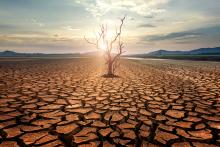The demand for talent in the field of sustainability is increasing, but the amount of expertise in the field is thin. As more nations take the step towards transitioning to greener and more sustainable economies, there is a need to develop workers with the necessary skills through a sustainability talent pipeline (a pool of candidates ready and equipped to take on the positions).
Last Update 05 June, 2023
Pricing climate risks properly today reduces the possibility of wealth transfers between uninformed and sophisticated agents, and the likelihood of extre
According to a December 2018 UN report on worldwide use of single-use plastics, 127 countries have “adopted some type of legislation to regulate plastic bags”. These include the 28 member states of the European Union, who last month voted to ban single-use plastic cutlery, straws, and cups by 2021.
How can you change a 2.6-million-year-old habit?
That’s when humans first added meat and marrow to their diet, providing us with a rich (and delicious) source of protein, iron, zinc, B vitamins, as well as essential fatty acids.
The latest report from the UN’s Intergovernmental Panel on Climate Change (IPCC) looks at the impacts, adaptation and vulnerabilities associated with the climate crisis, and we are three of the 270 scientists and researchers who wrote it. The document reports stark new findings on the way current global warming of 1.1℃ is impacting natural and human systems, and on how our ability to respond will be increasingly limited with every additional increment of warming.
In an episode of Changemakers' Conversations, a panel of speakers share their journeys on creating value in sustainability.
In the ‘Science’ section of Impossible Foods’ website is a page with the giant headline: HEME + THE SCIENCE BEHIND IMPOSSIBLE™. The page explains thus:
“Heme is what makes meat taste like meat. It’s an essential molecule found in every living plant and animal -- most abundantly in animals -- and something we’ve been eating and craving since the dawn of humanity.”
Price points, fundraising, and scaling are the unavoidable and necessary parts that turn sustainability dreams into reality. It helps to have investors that believe in both the mission and business.
Price points, fundraising, and scaling are the unavoidable and necessary parts that turn sustainability dreams into reality. It helps to have investors that believe in both the mission and business








